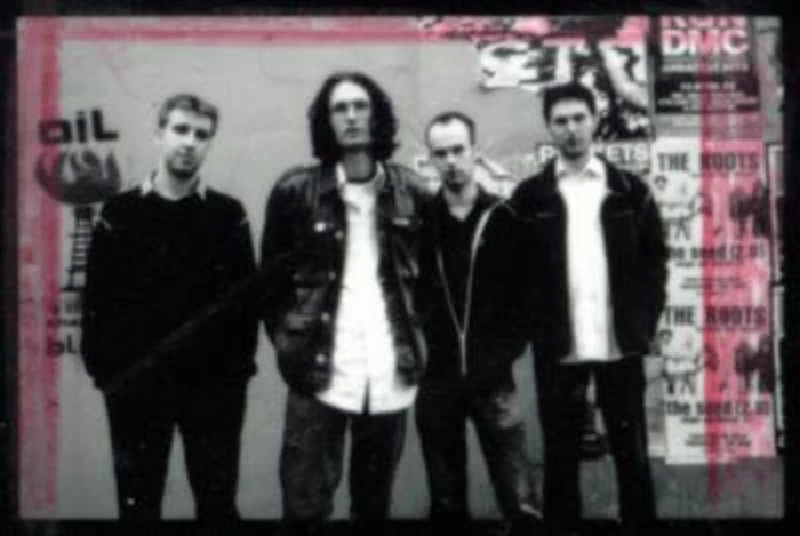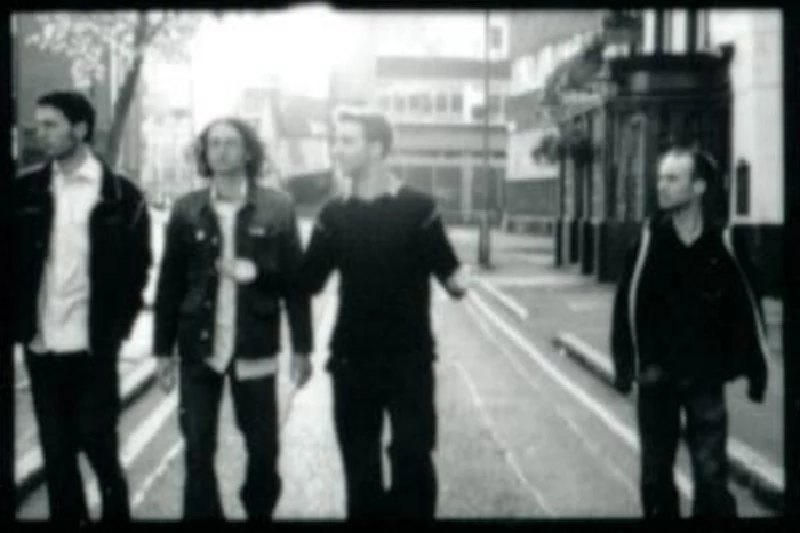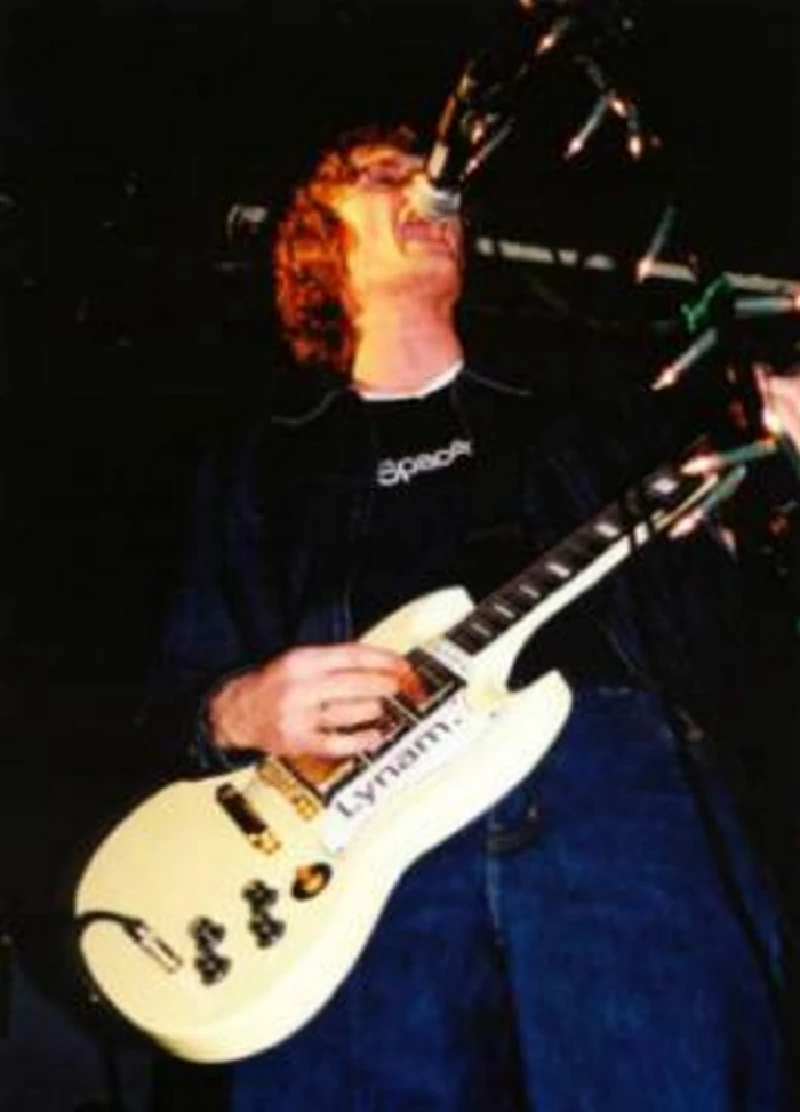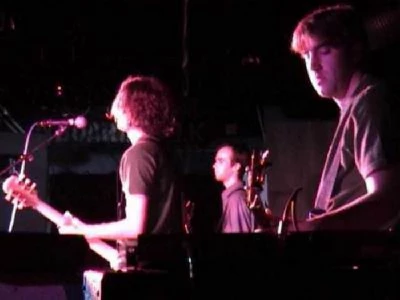Lazarus Effect - Interview
by John Clarkson
published: 16 / 8 / 2003

intro
Indie guitar band the Lazarus Effect have been in London for a year after forming Sheffield in four years ago. They talk to John Clarkson about their hunt for a deal, and their ultra-angry new second EP, "Easily Led'
London has always been something of a Mecca for unsigned bands. Since the 1950’s and the early days of rock ‘n’ roll, legions of groups from the provinces and the North have descended upon the capital, attracted by the cliche of its bright lights, its seemingly endless supply of clubs, venues and labels, and all looking for a still elusive deal. The Lazarus Effect, who originate from Sheffield, are just one of the latest in a long line of acts to make the trip South. Most bands who come to London usually break up within a few months, tiring quickly of playing to smaller crowds than those they generate back home, wearying also when the prize of a record contract remains still out of reach. The Lazarus Effect, who have been in London for just over a year, have already lasted longer than many of their contemporaries. Since their arrival, they have, however, used this time to their advantage, accepting disappointment as an inevitable part of a band’s cycle, and taking the opportunity to fine tune and perfect their sound. While their ambitions are totally serious, they have also never lost sight of the fun and enjoyment of playing music. Over the course of the last few months, they have, as they have taken this time to get things right, begun playing to a steadily widening fanbase. Success looks increasingly more likely. “It has been a lot harder than we all thought it would be” says bassist Daniel Walton. He is sitting with vocalist and guitarist Jonjo McNeill at a lunch table in London’s Spitalfields Market, and is talking to Pennyblackmusic two hours before the band is due on stage at the London Spitz at our third Bands Night. “I think we all thought getting gigs would be a lot easier, and there would be big crowds already here. We have played a couple of gigs where it has been us and the bar staff and a couple of drunks. We kind of had a perception that we would play a gig and straightaway pack in hundreds. It was all a bit naive really.” “Our first gig down here was in Camden” McNeill adds. “We thought ‘Wow, we’ve got a gig in Camden already’. And we got down there and thought that the venue was going to be real state of the art and in fact it wasn’t at all. It was a bit of a dump. Other than there obviously being more of them here, there’s not much difference between the venues up in Sheffield and many of the venues down here .” McNeill and Walton, who are both 23, have been best friends since childhood. They grew up together in the same Newcastle suburb and went to the same school. They first began playing music together in their mid teens, with Walton on vocals and McNeill on guitar, and then, when Walton concluded that he had no singing talent, with McNeill on vocals and Walton on guitar. The band was first formed, under its original moniker of Lynam, in 1999 when McNeill and Walton moved to Sheffield to study at its university and joined forces with fellow undergraduates guitarist Adrian Falconer and drummer James Mason. Lynam began to play to an increasing audience, the group’s abrasive, energetic guitar-based sound and McNeill’s hoarse, acrobatic vocals attracting many local-based fans. An early self-released first EP, ‘Disappointed’, came out in late 2001 and sold well. “We talked about moving down here two years before we did so” says McNeill, explaining the band’s decision to shift South. “Sheffield’s like a balloon. It was blown up as far we could go. London, however,seems bigger every time we go out.” “As you get more well known in London,you do notice that you get better gigs, In Sheffield though you start off there and you move there” he continues, giving his hand the slightest of flickers. Like many other student bands, Lynam was initially formed as much as anything else as an excuse for getting drunk. “We didn’t screen Adrian and James for their musical ability ” laughs Walton, describing Falconer and Mason’s induction into the band. “That very much came second. At the time we just wanted people we could get on with, and work with. When James joined the band, we all ended up going out on an 18 hour drinking spree together. It ended up with me having drunk over half a bottle of Jif and in complete chaos. We just didn’t care back then. We spent a lot of time getting drunk and trying to find our own sound. It was quite an exciting time really.” As the group has become more musically accomplished, and particulary since it has moved to London, it has however, begun to work to an increasingly tighter focus. The band made the decision at the start of this year as a reflection of this to abandon the moniker of Lynam, which its members had originally chosen as a tongue-in-cheek tribute to football pundit and sports commentator Des Lynam, for the new name of the Lazarus Effect. “When we started Lynam, we were doing cheesy mainly mid 90’s kind of rock stuff and sounded just like any other band” Walton reflects. “Especially since we have moved down here though, we have felt that our music has progressed and that there has been a lot more individuality to it. We wanted to start afresh and to leave Lynam behind. It was, therefore, important to kick that name in the head.” “It was quite embarassing when people asked us why we were called Lynam, and we had to say that we had named ourselves after Des Lynam” McNeill says. “It’s not a good name. With the Lazarus Effect, however, if you say you’re in the Lazarus Effect, people say that they have heard of you because it’s a more memorable name. The whole idea of Lazarus obviously stands for rebirth. We were reborn, weren’t we ? And we have moved on. In that respect it’s a better name also.” The band has also begun to put a stronger emphasis on the quality of their recordings. Shortly after they moved to London, they began work, in the basement of the house they were all sharing in Streatham at the time, on a 12 song debut “demo” album, ‘Carnaged and Martyred’, which they planned to tout around record companies and to sell at gigs. At the eleventh hour, however, they decided to largely abandon it as they felt they had rushed it and it wasn’t of a high enough standard. They have instead released a new EP, ‘Easily Led’. which features two new songs, ‘Someone Always Comes’ and ‘Heart to Feet’, and also three of the best songs from ‘Carnaged and Martyred’, the title track of the EP and two other numbers, ‘Hypocrite’ and Brian’. “With ‘Someone Always Comes’ we really took our time and made sure that we had got it right” says Walton. “With ‘Carnaged and Martyred’ we got a little bit excited and thought ‘Great ! Let’s get all the tracks down.” “We were all looking forward too much to the finished recording” McNeill reflects. “We just wanted to get it straight out, but then a month after we had finished it we all hated it. We re-recorded the new EP 4 or 5 times, however, to make sure that we got it right.” ‘Easily Led’ is packed with abrasive vibrancy and energy. The opening ‘Someone Always Comes’, the best song that the band feel that they have ever recorded, only last three minutes, but pushes together taut, swirling buzzsaw guitars, fiery drums and a dense, distorted bass line to create a multi-layered and epic sound. It is topped with a furious, chanted vocal from McNeill in which he rages at the fact that every time he is feeling happy someone or something always comes to screw it up. The rest of the EP resounds with a similar passion and dynamism, bouncing McNeill and Falconer’s agressive guitars up against tense, muscular rhythm work from Walton and Mason. ‘Hypocrite’ finds McNeill swiping out and taking broad shots at phoney political agitators. ‘Brian’ has him pouring scorn on a mean-spirited former friend, while on the title track he tries to force its gutless protagonist to make a stand for himself. Only the last track, the slightly more soporific ‘Heart to Feet’, which captures the tender, awkward early days of a romance, is softer. ‘Easily Led’ overall is a very angry record. “Anger is a sort of mental illness,” explains McNeill, when asked about this. “You get people who go to anger management. I have never been that angry that I have had to do that , but I used to shout a lot though, didn’t I ?” he says, looking at a nodding Walton. “I used to lose my temper at telly adverts and stuff like that. I have found though that the best way to get it out is in songs. I have channeled that aggression into songwriting.” “We’re typical examples of our generation” adds Walton. “We have all been fucked over by the government. Everyone in our entire generation is angry. I remember the night Blair got in and Labour won the election we were all so happy, as none of us were looking forward to the future under the Tory government, but it has been disappointment after disappointment after disappointment. It’s like how much more are they going to fuck you over. I have come out of uni with a degree, but I am also facing 15 grand worth of debt, and then they turn around and say university is not just for rich kids, Bollocks ! Everyone in our generation is angry. I think in our music and lyrics we portray some of that.” The Lazarus Effect intend to spend the next few months playing as many gigs as possible, and working on a third EP, which they hope to release at the beginning of next year. “There’s definitely a buzz around us at the moment” concludes McNeill. “John Peel talked about us the other day on Radio 1, and we are slowly getting more recognised. We keep hearing from people that we don’t know that are there, that have heard of us.” “Hopefully someone will eventually come and finance us and bring out a record. I wouldn’t compare us to a band like the Darkness musically, but they sold out the London Astoria before they had their record deal. 2000 people went out and saw the Darkness because they had a cult following. I would be totally happy to take that route and to build up the cult following first. Everyone in a band no matter what they say wants as many people as possible to hear them and to buy their record and to come and see them play. Hopefully we are going to play a lot of busier and better gigs during the next year.” The Pennyblackmusic gig is by no means the best gig the Lazarus Effect have ever played. London is in the middle of a heatwave, and much of the audience turns up late, only arriving in time to see the headliners Bikini Atoll and Lupine Howl. The Lazarus Effect’s set, however, goes down well with the 70 to 80 people who catch their performance. From the opening notes of ‘Someone Always Comes’, a small bunch of fans, both old and new, start hurling themselves around the front. The 25 minute show, which finds an empassioned McNeill flailing across the stage, and the rest of the band whipping up a steadily more vehement sound, finishes with a round of rapturuous applause. Afterwards some more copies of the ‘Easily Led’ EP are sold, and the band are approached by some other webzines interested in doing interviews and reviews. It is small, but nevertheless steady progress. A change is hopefully in the air.... The first three photos that accompany this article were taken by Heather Lewin, while the last two were taken by Denzil Watson
Picture Gallery:-




live reviews |
|
Verge, London, 17/6/2003 |

|
| Having moved down from Sheffield last year, the Lazarus Effect have become an increasingly steady presence on London's music scene. Olga Sladeckova catches a most "special" band in action |
reviews |
|
This End (2005) |
| Spikily intelligent new EP from indie guitar band the Lazarus Effect back with their first recoding in nearly two years |
most viewed articles
current edition
Carl Ewens - David Bowie 1964 to 1982 On Track: Every Album, Every SongArmory Show - Interview with Richard Jobson
Colin Blunstone - Thalia Hall, Chicago, 16/7/2025
John McKay - Interview
Visor Fest - Valencia, Spain, 26/9/2025...27/9/2025
Bathers - Photoscapes 1
Billie Eilish - O2 Arena, London, 10/7/2025
Loft - Interview
Robert Forster - Interview
Sir Tim Rice - Interview
previous editions
Manic Street Preachers - (Gig of a Lifetime) Millennium Stadium, Cardiff, December 1999Heavenly - P.U.N.K. Girl EP
Beautiful South - Ten Songs That Made Me Love...
Oasis - Oasis, Earl's Court, London, 1995
Prolapse - Interview
Boomtown Rats - Ten Songs That Made Me Love....
Trudie Myerscough-Harris - Interview
Peter Perrett - In Dreams Begin Responsibilities Interview Part One
Coldplay - Wembley Arena. London, 16/8/2022
Pixies - Ten Songs That Made Me Love...
most viewed reviews
current edition
Davey Woodward - Mumbo in the JumboAmy Macdonald - Is This What You've Been Waiting For?
Sick Man of Europe - The Sick Man of Europe
Phew, Erika Kobayashi,, Dieter Moebius - Radium Girls
Alice Cooper - The Revenge of Alice Cooper
Lucy Spraggan - Other Sides of the Moon
Bush - I Beat Loneliness
Suzanne Vega - Flying With Angels
Blueboy - 2
Cynthia Erivo - I Forgive You
Pennyblackmusic Regular Contributors
Adrian Janes
Amanda J. Window
Andrew Twambley
Anthony Dhanendran
Benjamin Howarth
Cila Warncke
Daniel Cressey
Darren Aston
Dastardly
Dave Goodwin
Denzil Watson
Dominic B. Simpson
Eoghan Lyng
Fiona Hutchings
Harry Sherriff
Helen Tipping
Jamie Rowland
John Clarkson
Julie Cruickshank
Kimberly Bright
Lisa Torem
Maarten Schiethart